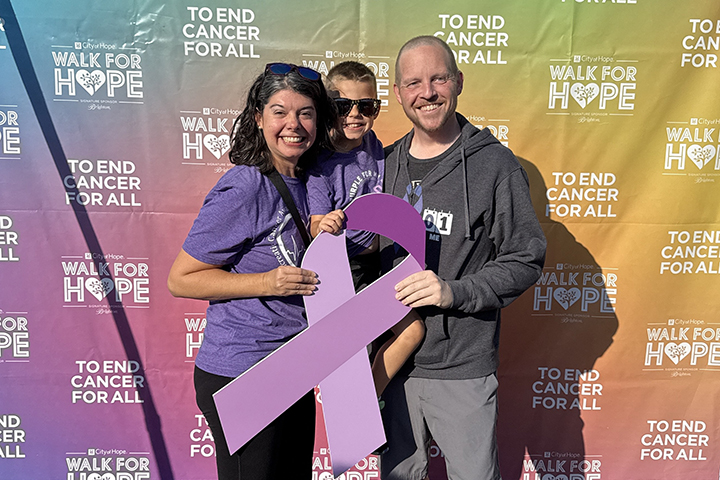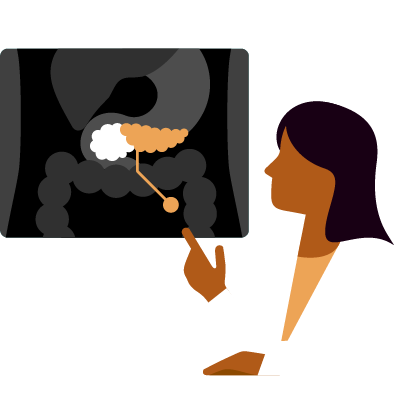Nutrition Myths Debunked

Oncology dietitians L.J. Amaral (left) and Jessica Harrison (right)
When you’ve been diagnosed with pancreatic cancer—or any other type of cancer—it’s natural to explore every avenue to help boost your odds of a positive outcome.
“When you have a cancer with a poor prognosis and limited options, you’re more willing to quite literally throw the kitchen sink at it to get either a better quality of life or more quantity of life,” says L.J. Amaral, M.S., R.D., certified nutrition coordinator at Cedars-Sinai Center for Integrated Research in Cancer and Lifestyle in Los Angeles, California. Unfortunately, that approach comes with significant drawbacks.
While experts agree that nutrition plays a powerful role in navigating cancer and its treatments, patients have to weed through a slew of misinformation to get the facts. We asked nutrition experts who are well-versed in the oncology space to separate fact from fiction for cancer’s most intractable nutrition myths.
Myth: Ditching sugar starves cancer
True, sugar is cancer cells’ preferred energy source. In fact, sugar feeds all of the body’s cells. “But even in the absence of carbohydrates or sugar, your body will make sugar from protein or fat to maintain balance,” says Amaral. That doesn’t mean you should gulp down bottles of soda, though, particularly if you have pancreatic cancer. About 80 percent of pancreatic cancer patients have abnormal fasting glucose levels (either type 2 diabetes or prediabetes) at the time of diagnosis. So odds are, your body is already struggling to keep blood sugar levels steady.
Your best bet: Steer clear of added sugars and processed foods and snacks; focus instead on eating whole fruits and vegetables in their natural form—which is the same advice for anyone, whether or not they have cancer. These complex carbohydrates produce a slow release of sugar into the bloodstream rather than a dramatic spike. They also tend to have more healthful nutrients your body needs for optimal functioning.
Myth: Pancreatic cancer patients should follow a ketogenic diet
Unfortunately, there isn’t one specific diet that produces the best cancer outcomes. Although a ketogenic diet will significantly reduce blood sugar levels as the body shifts into using fat for fuel, the resulting ketone bodies may be problematic. “I caution cancer patients against following the keto diet because ketone bodies have been shown in preclinical research to be used as a cancer growth factor, just like sugar,” says Jessica Harrison, M.S., R.D.N., a registered dietitian based in Santa Monica, California. Following a ketogenic diet can also make it difficult to maintain or gain weight, since pounds tend to fall away in the absence of carbohydrates. Instead of following a specific dietary plan, aim to eat a balanced diet that boasts plenty of micronutrients, fiber, and healthy fat.
Myth: Pancreatic cancer patients should avoid fats
Some pancreatic cancer patients are understandably leery about eating fat. Depending on your tumor location, inflammation level, and treatment course, your body may lack the necessary enzymes to digest fat—so you end up pooping it out. But as long as you’re supplementing your diet with pancreatic enzymes, you can and should aim to get some fat into your diet. “Fat not only helps you keep weight on because you can eat smaller volumes of food for the same calorie intake, but your body also needs fat to absorb fat-soluble nutrients like vitamins A, D, E, and K,” Amaral explains. Healthy sources of fat include avocados, olive oil, nuts, seeds, and fatty fish like salmon and mackerel. Don’t want to deal with digestive enzymes? Amaral recommends using medium chain triglyceride (MCT) oil supplements, since your body doesn’t need enzymes to break it down.
Myth: Pancreatic cancer patients should eat more calories, no matter the source
Whether you have cancer or not, what you eat matters. If you’re struggling to gain or maintain your weight, focus first on protein and fat. Protein helps build muscle mass and, if you’re suffering from a poor appetite, fat packs a lot of calories into a smaller volume of food (nuts, seeds, olives, olive oil, and avocados are all good choices).
While vegetables are typically the first to be nixed when your appetite wanes during treatment, Harrison suggests reaching for them as often as possible, even sneaking them into smoothies, soups, and muffins.
Still struggling with what to eat? “Try a favorite food from your childhood,” Amaral suggests. “That hit of nostalgia may stimulate your appetite.”
Myth: Juicing can slow cancer growth
Removing juice from whole produce strips out important nutrients, including fiber.
Unfortunately, when you remove that fiber, you not only lose nutrients, but you also flood your system with carbohydrates. So it’s like getting a large dose of sugar all in one shot. “To avoid the blood sugar spike and benefit from the micronutrients, drink juices with a meal, limit the amount of juice, or opt for a juice that is primarily vegetables, with little or no fruit,” Harrison says.
Myth: Acidic diets cause cancer
There’s a lot of talk about acidic foods fueling cancer—and that cancer cannot grow in alkaline environments—but there isn’t any research to substantiate the claims. “Every organ in the body relies on a carefully regulated pH and couldn’t function if the environment becomes too acidic or alkaline,” explains Harrison. “There are multiple acid-base regulating mechanisms in the body, mainly through the lungs and the kidneys, that tightly control the pH.” Those controls are in place even when you eat a highly acidic (or alkaline) diet.
The Bottom Line
“Nutrition is a critical part of your treatment plan, because you’re rebuilding your cells every time you choose to nourish yourself,” Amaral stresses. “So if you want to avoid treatment delays and minimize toxicities, you need to take eating just as seriously as any other aspect of your treatment.”




